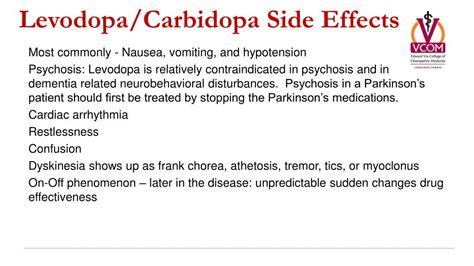Side Effects Of Carbidopa Levodopa

Carbidopa levodopa, a combination medication, is primarily used in the treatment of Parkinson’s disease. It works by increasing the levels of dopamine in the brain, which helps to alleviate symptoms such as tremors, stiffness, and difficulty with movement. While it is effective in managing the condition, carbidopa levodopa can cause a range of side effects, some of which can be mild and temporary, while others may be more severe and require medical attention.
Common Side Effects
- Nausea and Vomiting: Many patients experience nausea, especially when first starting the medication. This can often be managed by taking the medication with food or adjusting the dose.
- Dizziness and Lightheadedness: Changes in blood pressure can lead to feelings of dizziness, especially when standing up from a sitting or lying down position.
- Headache: Mild to moderate headaches are common, possibly due to the increase in dopamine levels.
- Fatigue: Some patients may feel more tired or weak, which could be due to the medication’s effects on the body’s energy levels and muscle strength.
- Mild Anxiety: Changes in neurotransmitter levels can sometimes lead to feelings of anxiety or restlessness.
Less Common but More Serious Side Effects
- Dyskinesia: Involuntary, erratic movements can occur as a side effect, especially with long-term use or at high doses. This condition, known as dyskinesia, can be a significant issue for some patients.
- Hallucinations: Some patients, particularly the elderly, may experience hallucinations, which can be distressing and require a review of the medication regimen.
- Confusion: Changes in mental status, including confusion and disorientation, can occur, especially in older adults or those with a history of psychiatric disorders.
- Vivid Dreams or Nightmares: The alteration in brain chemistry can lead to an increase in the intensity or vividness of dreams, which may be unsettling for some individuals.
- Orthostatic Hypotension: A drop in blood pressure upon standing can lead to dizziness or fainting, necessitating careful monitoring and possibly adjustments in medication or additional treatments.
Rare but Potentially Serious Side Effects
- Neuroleptic Malignant Syndrome (NMS): A rare but life-threatening condition characterized by high fever, stiff muscles, confusion, and changes in breathing and heart rate. Immediate medical attention is required if symptoms of NMS appear.
- Melanoma: There has been some concern about a potential increased risk of melanoma (skin cancer) in patients taking carbidopa levodopa, although the evidence is not conclusive. Regular skin exams are recommended.
- Severe Mental Changes: While less common, severe psychiatric effects such as depression, suicidal thoughts, or psychotic episodes can occur. Monitoring for these changes is crucial, especially in vulnerable populations.
Management of Side Effects
Managing the side effects of carbidopa levodopa often involves adjusting the dose or the timing of the medication. In some cases, adding other medications to counteract specific side effects may be necessary. It’s essential for patients to work closely with their healthcare provider to find the right balance that minimizes side effects while effectively managing Parkinson’s disease symptoms.
Important Considerations
- Regular Monitoring: Regular follow-up appointments with a healthcare provider are crucial to monitor the effectiveness of the medication and manage any side effects that may arise.
- Dose Adjustment: Adjusting the dose can help minimize side effects while maintaining therapeutic benefits.
- Combination Therapy: Sometimes, combining carbidopa levodopa with other Parkinson’s medications can help reduce side effects and improve symptom control.
- Lifestyle Modifications: Maintaining a healthy lifestyle, including a balanced diet, regular exercise, and getting enough rest, can also help manage side effects and improve overall well-being.
Conclusion
While carbidopa levodopa is a vital medication for the management of Parkinson’s disease, it’s crucial for patients and their caregivers to be aware of the potential side effects. By understanding these possibilities and working closely with healthcare providers, individuals can better navigate the treatment process and improve their quality of life.
What are the most common side effects of carbidopa levodopa?
+The most common side effects include nausea, dizziness, headache, fatigue, and mild anxiety. These are usually mild and temporary but can sometimes require adjustments in medication or additional treatments.
Can carbidopa levodopa cause serious mental health issues?
+Yes, while less common, carbidopa levodopa can cause severe mental changes, including hallucinations, confusion, depression, and even suicidal thoughts in rare cases. It's essential to monitor for these changes, especially in vulnerable populations.
How can I minimize the side effects of carbidopa levodopa?
+Minimizing side effects often involves working closely with your healthcare provider to adjust the dose or timing of the medication. Maintaining a healthy lifestyle, including a balanced diet and regular exercise, can also help reduce side effects and improve overall well-being.
In conclusion, while carbidopa levodopa is an effective treatment for Parkinson’s disease, it’s essential to be aware of the potential side effects and work closely with healthcare providers to manage them. By doing so, individuals can maximize the benefits of the medication while minimizing its drawbacks.



